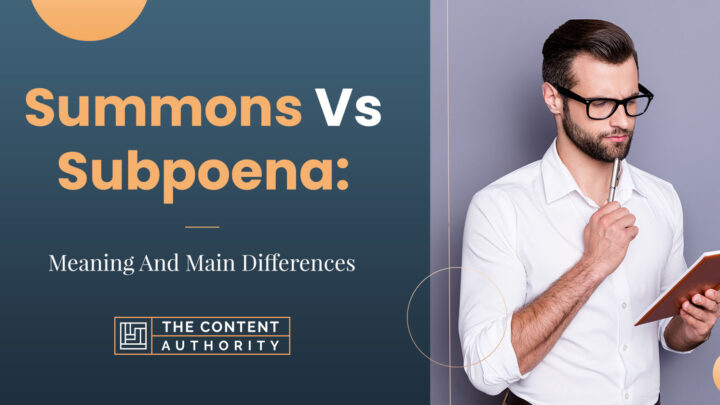A summons and subpoena are law jargons that often confuse many English speakers. Both words apply in a court proceeding. You need to know summons vs. subpoenas to understand these words in detail.
A summons is an official notice of a lawsuit given to a lawsuit subject or defendant to inform them of the lawsuit so they can prepare to go to court and fight it. However, a subpoena is a writ of court order informing someone that they must come to court, attend a deposition, or hand over evidence.
A summons and subpoena are similar because they are both given to people going through court proceedings. However, this is as far as their similarities go. This post discusses the summons and subpoena, how the terms are similar, their definitions, and differences.

Definitions of Summons and Subpoena
The legal sector features many jargons often misunderstood because of their similar definitions and applications. An example of correlated legal jargon is the word summons and subpoena. Here are the extensive definitions for each;
Definition of Summons
A summons is an official notice informing someone they have a lawsuit against them. So, it is given to the lawsuit defendant so they can know about it and come to court and fight the lawsuit. For example, “The defendant was served with a summons during his child’s basketball game.”
Therefore, anytime you file a lawsuit against someone or an organization, you must give them a summons in a procedure called the “service of process.” It is worth noting that specific rules for giving or serving someone the summons ensure proper case filing. For example, “The United States legal system allows the sheriff to serve summons to a defendant on behalf of the person filing the lawsuit.”
The word summons also means “to call to do something; to come.” For example, “James received a summons to go to his family’s ranch in Ohio.” In the military, a summons is “a demand for surrender.”
Definition of Subpoena
A subpoena is a court order that informs a person that they must attend court, go to a deposition, and provide documents or evidence for a certain case. For example, “Receiving a subpoena for the case during the family outing annoyed Marcus.”
A subpoena applies in cases with witnesses that do not want to testify in court willingly but are a significant part of the case. Therefore, the court will issue a subpoena that requires them to attend the court case as a witness. Also, a subpoena applies when both sides in a trial discover information and evidence they need for their case. Either side will issue a subpoena during the evidence recovery.
For the two definitions, you can say that a subpoena is more powerful and serious than a summons because of how the court of legal system views them and the repercussions of ignoring them.
How to Properly Use Summons and Subpoenas in a Sentence
The proper use of a word in a sentence depends on its meaning, type, and basic sentence construction rules. For instance, the word’s meaning will determine the context in which you use the word. The word’s type (noun, verb, adjective, etc.) determines where it is used and positioned in the sentence.
How to Use Summons
A summons is a noun. You can use it as the subject or direct and indirect object in a sentence. As a sentence subject, the entire sentence centers on the summons. For instance, “Nunn had the Sheriff serve a summons to Olivia during her live performance at the Grammys.”
The summons must be a direct recipient of action as a direct object. For example, “Jane tore the summons immediately when she realized what it was.” Also, you can use this word as an indirect sentence object.
Apart from being a noun, “summons” is also a verb meaning “to serve someone with a summons or to call.” For example, “The horn has gone off as the shepherd summons the sheep.”
Other word forms you can use for “summons” are; summonsed (past tense), summonses (simple present indicative form), summonsing (the present participle), and summonses (plural). Note that summons (as used in law) is not plural for “summon.” That means leaving out the “s” at the end changes its meaning.
How to Use Subpoena
Like “summons,” you can use “subpoena” as a noun or verb. The rules for sentence construction for both words are similar.
However, the difference in their usage in sentences lies in the contexts. For instance, you can use “subpoena” when referring to a written and official legal document requiring someone to appear in court to give testimony or provide documents or evidence.
For example, “James was handed a subpoena after refusing to testify willingly.” You can also use this word as a verb, meaning “to summon someone to court with a subpoena.” For instance, “The court issued a subpoena for Mercy to provide testimony.”
You can use other versions of the word, like subpoenas (plural), subpoenaed (past tense), subpoenaing (the present participle), and subpoenaed (past participle).
Summon Vs. Subpoena: Main Differences
Besides the fact that summons and subpoenas are usually part of a court proceeding, another similarity is that the person receiving them should not ignore them. However, a summons is not an order. Therefore, you do not have to do what it says.
Nevertheless, you may lose the lawsuit if you ignore it, as the court decides cases against people who ignore a summons. Also, the court may mandate that you pay a fine and give up your right to fight whichever decision the court makes.
In contrast, ignoring a subpoena would be unwise because it is an order from the court. Therefore, the court will find you in contempt and may issue an arrest warrant if you ignore it. In fact, ignoring a subpoena may result in jail time or a large fine. If you receive a subpoena but do not want to comply, you are free to talk to an attorney for guidance.
Another difference is that you serve a summons explicitly to someone you are suing or a defendant in a lawsuit. However, you can issue a subpoena only to someone not being sued. For instance, you can subpoena someone who is a witness to a crime or holds evidence of a case.
Examples of Summons and Subpoena Use in Sentences
You can now use the two words comfortably without confusion. Here are some sentence examples featuring both terms to inspire you.
Example sentences of summons
- A summons secured John’s attendance in court.
- Bradley Cooper shocked the world when he served Newton a summons during a live event.
- The summons came early enough for my family to prepare to fight the lawsuit.
- I received a summons that my mother sued me in December.
- The lawyers advised Mark not to respond to the summons because of how weak the lawsuit was.

Example sentences of subpoena
- The subpoena sought all financial records and tapings related to the case.
- The court sentenced John to six months in prison for ignoring the subpoena.
- According to the subpoena, Jane should appear in court on the 21st of March to provide witness testimony.
- Ignoring a subpoena has more repercussions than most people assume.
- Our company chooses to fight against the subpoena because handing over our legal documents goes against our legal agreements with clients.
Conclusion
The words “Summons” and “subpoena” refer to official documents issued to individuals in legal proceedings. However, their purpose and the people to whom they are issued differ. These legal terms are not as complex as most people assume. So, make sure you understand the words’ definitions and differences before usage.
Shawn Manaher is the founder and CEO of The Content Authority. He’s one part content manager, one part writing ninja organizer, and two parts leader of top content creators. You don’t even want to know what he calls pancakes.

